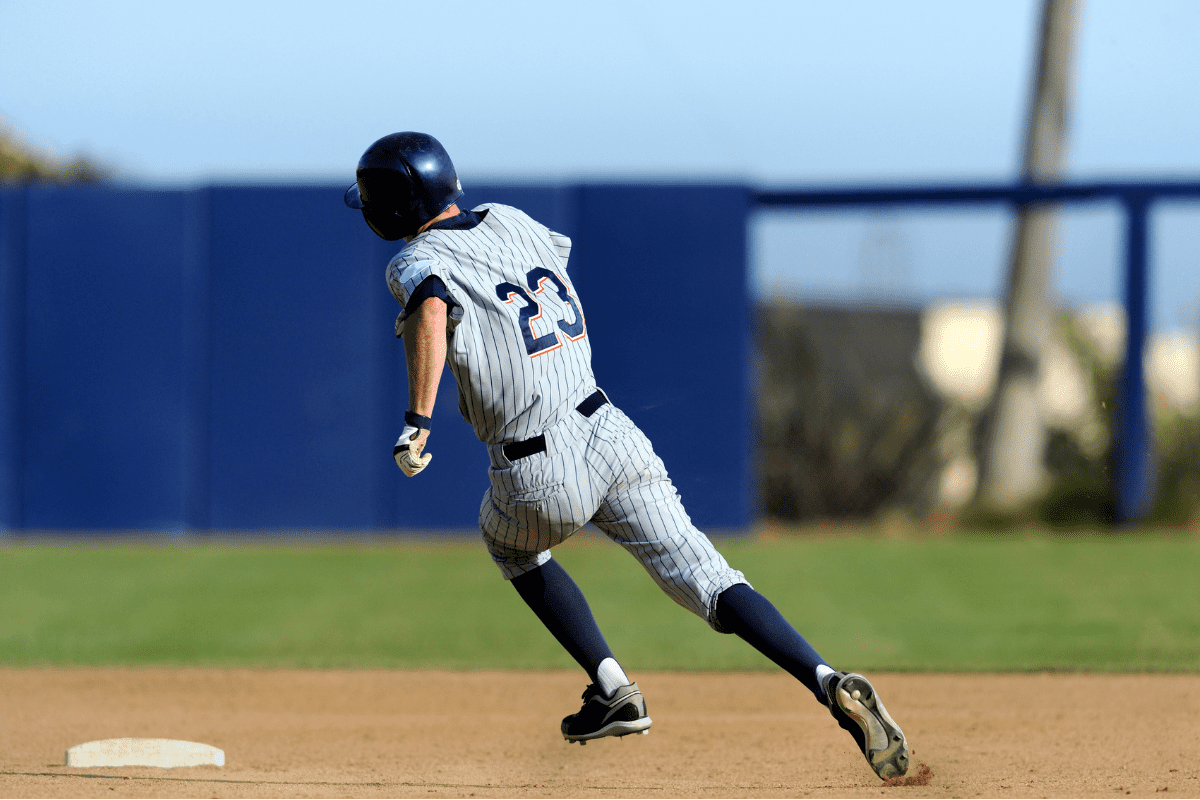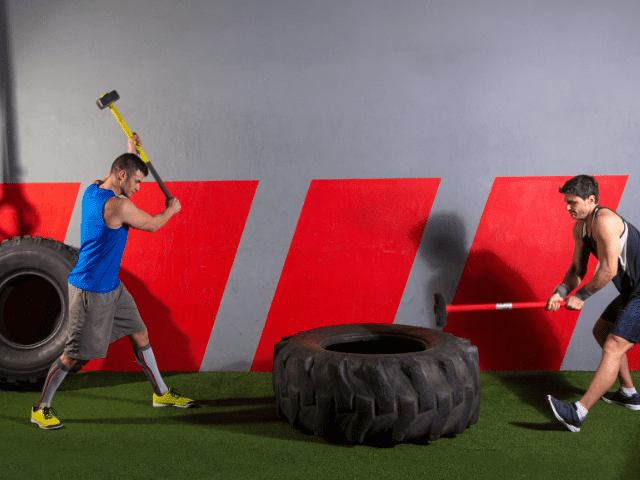

Improving your speed and conditioning in baseball is oftentimes a game changer. Stealing bases, getting that double or triple, and being in better shape than the other team is sometimes the difference between a win or a loss.
I am a big believer in sport-specific conditioning. During a game, in most plays in Baseball, it is all about being fast and explosive. We also need to work on our general work capacity and being in shape throughout the off-season and at practice (2-4+ hours).
This is important because once the season starts, you need to be able to consistently perform at your position and in the lineup when you have 4-5 games per week.
In this guide, I will be going over baseball conditioning drills that will help baseball players improve their overall performance, general, and specific conditioning for baseball, and more!

There are 3 primary energy systems that deliver ATP (Adenosine triphosphate) to the muscles which fuel our work on the field or in the weight room. These systems all work together. Each system is used primarily in certain time frames of work but at no point are any of the systems completely “off”.
I do want to reiterate here that all players use all systems.
For example, a pitcher will use the creatine phosphate system to deliver as hard of a pitch as possible within a very short amount of time. But he will also use the other systems to help recover and repeatedly perform his high-intensity pitches.
It is important for all players to train these systems.
In my opinion, the anaerobic glycolytic systems and aerobic systems can be trained through practice and in the early off-season.
The creatine phosphate system is trained very naturally during the game of baseball because throwing and hitting are all about producing as much power as possible, as quickly as possible. This is also a system that can be trained in the weight room through explosive sport-specific strength training.
In baseball, you do not need to train long distance running!
Most plays last less than 10 seconds and therefore baseball players need to train to be fast and explosive as that is the primary energy system. With that said, you still need to be in shape for practice and the long, grueling season.
I would recommend the following baseball conditioning drills be done at the end of a weight lifting session, after practice, or on a separate day all by themselves.
These drills are low-impact conditioning drills to help with general work capacity. I think these are great drills to be done during the off-season or in-season if you have a bye week or significant downtime.
One of the most popular conditioning drills for baseball players, tempo runs focus on building work capacity and running form. These types of runs are generally done at 65-75% capacity for a set interval distance with a predetermined rest period.
You should not feel exhausted here. You should be able to recover from each repetition and have high-quality running technique.

A low-impact tool that baseball players can benefit from, is the prowler push, also known as sled pushes.
This unique implement allows players to build strength and conditioning simultaneously. You will need a prowler and at least 20 yards of turf. Keep those arms extended, drive the knees, and push through the balls of your feet.
Pro Tip: Use lighter weight to go faster to focus on conditioning. Use heavier weight to slow the movement down and emphasize strength development.

Circuit training is another great way to build general conditioning for baseball. Circuit training combines conditioning with strength training, core stability and even a little bit of power development depending on the circuit.
Choose 10 movements hitting all the major muscle groups, set a clock for 10-20 minutes, and get as many reps in as you can in that time frame.
Rest as needed between stations but keep that heart rate up!
For example:

Tabata-style conditioning consists of high-intensity work where you perform the exercise for 20 seconds and rest for 10 seconds, for eight rounds.
This is a great form of conditioning because it can be done with almost any exercise, is generally low impact, drives the heart rate up, and trains all 3 energy systems efficiently.
Some example exercises for this style of training include but are not limited to:
One of my favorite types of conditioning is what’s called repeat sprint ability. There are many different forms and drills here, linear, and multi-direction drills. The idea is that you perform this type of conditioning 2 days per week.
Keep the drills short, within 10 yards, and go all out. Rest 30 seconds between reps, and about 3 minutes between sets.
Pro Tip: Don’t confuse speed training with conditioning drills! Speed training should emphasize maximum speed every rep and allow full recovery between reps. Conditioning drills utilizing sprints are still high effort, but the rest is shortened to tax the anaerobic systems.
For example:

Here are some sample weeks for baseball conditioning, from the off-season, pre-season and in-season.
| Baseball Off-Season Conditioning | |||
| Practice volume is low, weight room emphasis is high | |||
| Sample Off-Season Week | |||
| Day 1 | Day 2 | Day 3 | |
| Exercise | 100 Yard Tempo Runs | Body Weight Circuit | Prowler Push (Conditioning emphasis, light load) |
| Sets | N/A | 3 | 10 |
| Reps | 8 | 10 | 20 Yards Down & Back = 1 Set |
| Rest | 1 minute | 1 minute rest between sets (min rest between exercises) | 1 minute |
| Baseball Pre-Season Conditioning | |||
| Practice/Competition volume is moderate/high, weight room emphasis is moderate high | |||
| Sample Pre-Season Week | |||
| Day 1 | Day 2 | Day 3 | |
| Exercise | Repeat Effort Sprints | Tabata Style Sledge Hammer | Prowler Push (Strength-Speed Emphasis, Moderate Load) |
| Sets | 3 | 8 | 6 |
| Reps | 3 + 3 + 3 | AMAP | 10 Yards Down & Back = 1 Set |
| Rest | 30 Seconds Between Reps 3 Minutes Between Sets | :10 Seconds Between Efforts | 2 – 3 Minutes |
| Baseball In-Season Conditioning | |||
| Competition volume high, 1 intense weight room day, 1 light weight room day | |||
| Sample In-Season Week | |||
| Day 1 (Mon after Weekend Series) | Day 2 (After Midweek Game) | Day 3 (Prior to Weekend Series) | |
| Exercise | 60 Yard Tempo Runs | Prowler Push (Speed-Strength Emphasis, light load) | Body Weight Circuit (Emphasis on Range of Motion) |
| Sets | N/A | 10 | 3 |
| Reps | 12 | 10 Yards Down & Back = 1 Set | 10 Reps Each |
| Rest | 1 Minute | 1 – 2 Minutes | 1 Minute Between Sets Min Rest Between Exercises |
Always keep in mind your goals, position, and time of year when you are conditioning for your sport. High-intensity, low-impact, sport-specific baseball conditioning will be more beneficial to baseball players than just arbitrarily just jogging or riding a stationary bike.
The goal with your baseball conditioning should be to improve athletic performance, not to be prepared to run a 10k!
Make a plan, get after it, adjust, and progress!